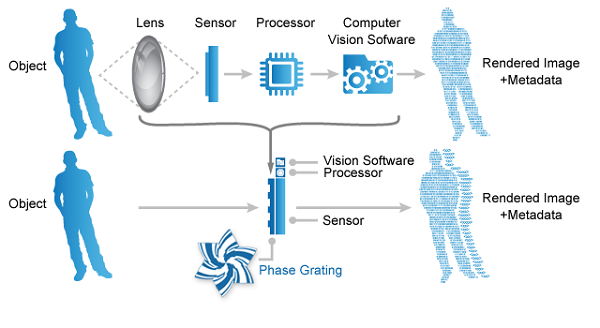
And you thought that HTC’s UltraPixel technology was cool? Wait till you learn about the lensless smart sensor developed by technology licensing company Rambus.
Not long ago, the people behind this project showcased a reproduction of Leonardo da Vinci’s Mona Lisa that was captured using a lensless smart sensor measuring just 200 micrometers across. This definitely sounds like sci-fi, but this sensor, which is no larger than a pencil point, could one day add eyes to any device. Of course, the resulting images are far from the ones obtained with DSLRs or even with modern smartphone cameras, but the idea itself of creating images using something that doesn’t have a lens is simply otherworldly.
Patrick Gill from Rambus insists that he did not want to create a high-resolution camera. Instead, his goal was from the beginning to create the world’s easiest to make optical sensor, which in addition should have very small dimensions and be extremely affordable. As Gill put it, “Our aim is to add eyes to any digital device, no matter how small.”
Gordon Wetzstein, a research scientist at MIT Media Lab’s Camera Culture Group, really thinks that this concept has a lot of potential, even though he cannot pinpoint the method it could be implemented: “Other than pixels getting smaller, we haven’t really seen much progress in camera sensors for a while.” Wetzstein most probably refers to HTC’s UltraPixel technology, which enabled last year’s HTC One (as well as this year’s HTC One M8 or the All New One 2014) to come with 4 MP camera which could provide the same quality as cameras with more megapixels. What HTC demonstrated last year was that the number of pixels is irrelevant, and what matters is the quality of the picture. Rambus goes even further with this idea, and demonstrates that devices don’t even need lenses in order to take photos.
This is by no means the first lensless camera ever to be created, but Gill believes that it is far less complex than say Bell’s, and at the same time, it’s a lot smaller than that. The addition of such a lensless smart sensor as the one developed by Rambus would only increase the cost of existing sensors by a few cents, and the results would be definitely worth it.
Be social! Follow Walyou on Facebook and Twitter, and read more related stories about Garmin’s spy camera that hides inside your windshield and the Remoca dog food bowl camera that keeps an eye on your pet.



